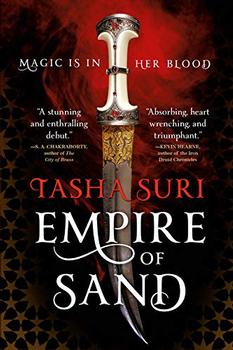Summary | Excerpt | Reading Guide | Reviews | Beyond the book | Read-Alikes | Genres & Themes | Author Bio

A Novel
by Anita AmirrezvaniIn 17th-century Persia, a young woman and her mother find themselves alone and without a dowry. Forced into a secret marriage to a wealthy man, the young woman is faced with a daunting decision: forsake her own dignity, or risk everything she has in an effort to create a new life.
In 17th-century Persia, a 14-year-old woman believes she will be married within the year. But when her beloved father dies, she and her mother find themselves alone and without a dowry. With nowhere else to go, they are forced to sell the brilliant turquoise rug the young woman has woven to pay for their journey to Isfahan, where they will work as servants for her uncle, a rich rug designer in the court of the legendary Shah Abbas the Great.
Despite her lowly station, the young woman blossoms as a brilliant designer of carpets, a rarity in a craft dominated by men. But while her talent flourishes, her prospects for a happy marriage grow dim. Forced into a secret marriage to a wealthy man, the young woman finds herself faced with a daunting decision: forsake her own dignity, or risk everything she has in an effort to create a new life.
Part Arabian nights fairytale, part historical fiction, and part feminist treatise, this novel combines different motifs in a delightful and captivating manner. Written in plain, earthy, yet colorful prose, interspersed with Persian folktales, Amirrzvani's strengths come from her ability to make the sounds, smells, and architecture of this ancient Persian world come alive...continued
Full Review
(817 words)
This review is available to non-members for a limited time. For full access,
become a member today.
(Reviewed by BookBrowse Review Team).
Evidence of settled communities in Iran date back to at least the 5th millennium BC (as evidenced by 7,000 year-oldwine jars that have been excavated in the Zagros Mountains).
Cyrus the Great is credited with establishing the first unified empire during his 21 year reign beginning in 550 BCE. He is also remembered for theCyrus Cylinder (discovered in the 19th century and housed in the British Museum) which some consider to be the "first charter of human rights". However, apparently it is just one example of a long tradition (dating back to the third millennium BC) in which Mesopotamian kings began their reigns with a declaration of reforms.
Shah Abbas I
Two thousand years after Cyrus the Great, Shah Abbas I, a member of the Safavid dynasty ...
This "beyond the book" feature is available to non-members for a limited time. Join today for full access.

If you liked The Blood of Flowers, try these:

by Jamila Ahmed
Published 2024
In this riveting take on One Thousand and One Nights, Shaherazade, at the center of her own story, uses wit and political mastery to navigate opulent palaces brimming with treachery and the perils of the Third Crusade as her Persian homeland teeters on the brink of destruction.

by Tasha Suri
Published 2018
A nobleman's daughter with magic in her blood. An empire built on the dreams of enslaved gods. Empire of Sand is Tasha Suri's captivating, Mughal India-inspired debut fantasy.



When I get a little money I buy books...
Click Here to find out who said this, as well as discovering other famous literary quotes!